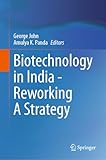Biotechnology in India - Reworking a Strategy / Edited by John, George and Panda, Amulya K.
Publication details: Singapore Springer Nature 2024Description: xii, 366 pages 24 cmISBN:- ISBN:9789819708956 (Hardback)
- 660.6072054
| Item type | Current library | Shelving location | Call number | Materials specified | Status | Notes | Barcode | |
|---|---|---|---|---|---|---|---|---|
 BOOKs
BOOKs
|
National Law School | General Stacks | 660.6072054 JOH (Browse shelf(Opens below)) | HB | Available | Recommended by Prof. Dr. Sudhir Krishnaswamy | 39921 |
Part I: Agriculture Biotechnology:
1: Transforming Indian Agriculture Through Genome Editing Technologies: Challenges and Opportunities;
2: Genetically Modified Crops for Sustainable Agriculture and Food Security in Indian Scenario;
Part II: Animal Biotechnology:
3: Reaping the Benefits of Gene Modulations in Animals in the Era of Genomics;
4: Marine Biotechnology in India: Status and Unfolding Opportunities;
Part III: Medical Biotechnology:
5: Unveiling Fundamentals and Research Opportunities of mRNA Technology;
6: Vaccine Research and Development in India for COVID-19 and Influenza;
7: Development of Genetically Engineered Vaccine and Post-Exposure Therapy Against Anthrax;
8: Artificial Intelligence in Healthcare: India Case Study;
Part IV: Industrial Biotechnology:
9: Fermentation Technology: Driving Biotechnology to Work;
10: Lignocellulosic Biomass Based Biorefinery Employing Fungus and its Enzymes: Indian Perspective and Global Trend;
11: Innovations in the Pharma and Biopharma Industries: Role of Academia–Industry Interactions;
12: Catalysing and Accelerating a New Phase in Indian Biopharma;
Part V: Regulatory Framework:
13: Genetically Modified Organisms and Products in India: History of Regulation, Promotion, and Issues;
Part VI: Human Resource Development:
14: Biotechnology in India: Four Decades of Human Resource Development: Challenges and the Road Ahead.
This book examines the progress in the biotechnology sector in India towards knowledge and innovation driven Bioeconomy. The chapters of the book review different genome editing techniques and the GM crops focusing on the emerging potential in agricultural biotechnology. Chapters on Vaccines and AI in healthcare unfold huge opportunities in medical biotechnology. The book covers the advances in biotechnology towards delivering important benefits of healthcare, particularly through the pharmaceutical industry focusing on new healthcare interventions and delivering innovations. Further, it explores the major opportunities in industrial biotechnology related to bio-pharma, biorefinery, fermentation biotechnology, and growing synergies between industry-academia. Toward the end, the book also reviews the genetic regulation and the critical role of HRD. In summary, the book emphasizes on India as a strong bio-manufacturing hub for innovative, affordable and accessible products for the society and also for global markets while describing the sector wise strategies required.
There are no comments on this title.
